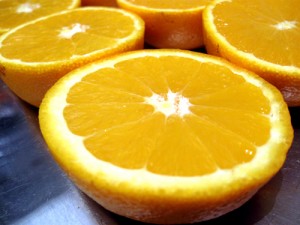
More evidence that low-calorie sweeteners are bad for your health
Studies show that artificial sweeteners can raise the risk of hypertension, metabolic syndrome, type 2 diabetes and heart disease, including stroke.

Natural Health News — Mothers who take amine-containing drugs prior to or early after conception have a greatly increased risk of having a baby with a neural tube defect (NTD). But, according to a new study, this risk can be lessened with adequate vitamin C intake.
Amine-containing (or nitrosatable) drugs such as antihistamines, antidepressants, antibiotics and some cough medicines can react with nitrites in the body to form N-nitroso compounds (the same compounds formed from cigarette smoking), some of which are known to cause developmental abnormalities such as neural tube defects.
What is less clear, say scientists, is whether dietary factors, can reduce the risk. Nitrite levels in the body depend on both nitrate and nitrite levels in food and water. The higher the levels the more the body will react with amine-containing drugs to form N-nitroso compounds. Nutrient intake may also have a modifying effect.
Using data from the US National Birth Defects Prevention Study, researchers at the examined amine-containing drug exposure 1 month before and 1 month after conception in 1,223 case mothers with neural tube defect-affected pregnancies and 6,807 control mothers who delivered babies without major congenital anomalies from 1997 to 2005.
The researchers found that exposure to amine-containing drugs one month before and one month after conception doubled the risk of NTD. Babies whose mothers’ diet contained higher levels of nitrites were at much greater risk of being born with a NTD. The level of risk increased from 16% greater for those women with the lowest intake to 250% greater for those with the highest intake.
But when women took vitamin C supplements the risk was greatly reduced. Amongst women whose daily intake of Vitamin C greater than 85mg – the amount found in one and a half oranges – the risk for spina bifida was only 15% higher than normal, compared with 81% higher in women with a lower vitamin C intake.
Although women have long been advised to take folic acid to prevent NTDs, this study suggests that attention to overall nutrition, rather than single ‘magic bullet’ nutrients, may be more beneficial.
Foods high in nitrites include preserved and smoked meat (such as bacon and deli meats) – which have also been linked to a higher incidence of bowel cancer.
Many green leafy and root vegetables such as spinach, beetroot, radishes, and carrots, also contain nitrates which can be converted in the body to nitrites, though opinion is divided about how meaningful a contribution this makes to illness because unlike preserved meats, vegetables also contain high levels of other important antioxidant nutrients.
Choosing organic vegetables is one way to reduce unnecessary exposure to nitrates in produce. For information on this see this study by the US based Organic Center and another publication Health Benefits of Organic Food: Effects of the Environment published by Centre for Agriculture and Biosciences International (CABI).
Exposure through drinking water – is likely to be more meaningful. Both nitrate and nitrite are considered hazardous, and there are legal limits to their concentration in food and drinking water. Nitrate from fertiliser accumulates in vegetables and fruit, and large-scale livestock production yields huge amounts of nitrate-rich that seeps into groundwater.
Reverse osmosis water filters can remove nitrates/nitrites from drinking water. Jug filters, though effective for other types of contaminants, do not remove these substances.

Please subscribe me to your newsletter mailing list. I have read the
privacy statement